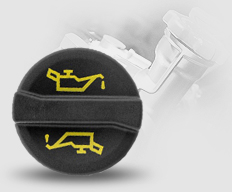NOT ALL OILS ARE THE SAME!
So can engine oil really make a performance difference? Can the fluid actually improve the efficiency and durability of an engine?
We can definitely say Yes. Our lab routinely records the improvements we create in performance and wear reduction..
But what does oil do?
Oil protects metal to metal contact, by forming a protective layer between each component. Additives within the oil respond giving protection under various different mechanical processes found in an engine.
Oil cools components, especially pistons and crankshafts. It is essential in cooling parts at the heart of the combustion process which the dedicated cooling system finds difficult to access.
Oil collects and carries by-products in suspension, preventing build up within the crankcase and cylinder head to keep the engine clean. Towards the end of the oil’s service life, debris includes oxidised oil no longer able to fulfil its function.

Engine oil is a blend of base oils and additives; advanced engine oils can consist of 10 or 12 separate elements. To add an element is to reduce the amount of base oil, affecting the lubrication. For the engine’s performance to be optimised it is important that everything present in the blend has a vital role to play. It is therefore clear that there is scope for real differences in performance between oils.
Oil must work harder than ever in today’s low emission environment due to turbochargers, downsizing and thinner viscosities. High local temperatures in turbochargers and extended services mean oil really has got its work cut out.
Recognising this, we have developed a innovative low friction technology, which reduces oil’s coefficient of friction and improves film strength across the temperature gradient. We have seen benefits in race cars, road cars and commercial vehicles.
This is the difference between DRIVOL and the rest.




